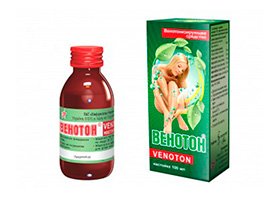
All iLive content is medically reviewed or fact checked to ensure as much factual accuracy as possible.
We have strict sourcing guidelines and only link to reputable media sites, academic research institutions and, whenever possible, medically peer reviewed studies. Note that the numbers in parentheses ([1], [2], etc.) are clickable links to these studies.
If you feel that any of our content is inaccurate, out-of-date, or otherwise questionable, please select it and press Ctrl + Enter.
Venoton
Medical expert of the article
Last reviewed: 03.07.2025

Venoton is a capillary stabilizing medication.
ATC classification
Active ingredients
Pharmacological group
Pharmachologic effect
Indications Venoton
It is used for various diseases affecting the veins in the legs:
- varicose veins, venous insufficiency (cramps in the calf muscles, swelling of the legs, a feeling of heaviness, numbness or pain in the legs), phlebitis or thrombophlebitis, as well as ulcers in the shin area;
- swelling and pain that occur when receiving bruises in the area of joints or muscle tissue;
- hemorrhoids;
- severe overload or sprain of ligaments;
- hematomas of traumatic origin.
Pharmacodynamics
Venoton has anti-inflammatory, capillary-protective, anti-edematous, venotonic, and, in addition, anti-exudative properties.
Aesculus extract stabilizes venous tone and protects capillaries, eliminates edema, and has an anticoagulant and antiplatelet effect. All these properties are due to the activity of esculin (flavone glycoside) and escin (saponin).
Esculin strengthens capillary strength, stimulates the antithrombotic effect of blood serum and increases the production of the element antithrombin within the reticuloendothelial vascular system. In addition, it increases venous blood filling, especially if there are pathogenic changes inside the veins.
Escin reduces blood viscosity.
The main active element of Japanese stryphnolobium is rutin, which has the ability to thicken vascular walls by reducing their fragility. It also helps restore vascular elasticity. It has anti-inflammatory and soothing activity.
Oats have an amino acid composition that helps to excrete excess cholesterol from the body. This component also has a general strengthening effect.
Rowan berries have anti-inflammatory and antihypertensive effects, and also provide protection for capillaries.
Hazel leaves strengthen the membranes of blood vessels and also exhibit vasoconstrictor and anti-inflammatory activity.
The bioactivity of sweet clover is due to the action of its constituent element coumarin. It increases blood pressure, increases cardiac output, and also helps improve peripheral and cerebral blood supply.
Celandine herb has an anti-inflammatory effect.
Dosing and administration
The medicine is taken orally. Take 1 teaspoon (5 ml) per quarter glass of plain water. The dose is taken half an hour before meals, 3-4 times a day. The therapy cycle lasts 20 days. After 10 days, the treatment can be repeated. No more than 20 ml of the drug can be consumed per day.
Use Venoton during pregnancy
It is prohibited to use Venoton during lactation or pregnancy.
Side effects Venoton
The use of tincture may cause the appearance of certain side effects:
- dysfunction of the cardiovascular system: heart pain, high blood pressure and tachycardia;
- skin lesions: symptoms of hypersensitivity, including itching, urticaria, rashes, feeling of heat and Quincke's edema;
- digestive system disorders: epigastric pain, dyspeptic symptoms, vomiting, diarrhea, heartburn and nausea.
If negative effects develop, you must stop using the drug and consult your doctor.
Overdose
Intoxication may provoke an increase in the severity of negative manifestations. The use of excessively high dosages may cause dizziness, gastrointestinal dysfunction, vomiting, respiratory distress, headaches and nausea.
In case of poisoning with esculus fruits, the following symptoms may be observed: development of nephrotoxic symptoms, anxiety or thrombosis. Severe diarrhea is also possible, which leads to vomiting. Among other disorders are delirium, drowsiness and mydriasis. In case of respiratory paralysis, death may occur after 24-48 hours.
When treating these symptoms, you must first stop taking the drug. Then, if there is no vomiting while taking a large portion of the substance from the fruits of the esculus, you need to perform gastric lavage and give the patient activated carbon. Symptomatic procedures are also performed.
Interactions with other drugs
It is prohibited to combine Venoton with aminoglycosides, because this increases the level of nephrotoxicity of the substance.
If use in combination with anticoagulants is required, the dosage of the latter should be reduced.
Concomitant use of the drug with cephalosporins is prohibited.
Shelf life
Venoton can be used within 24 months from the date of manufacture of the therapeutic drug.
 [ 34 ]
[ 34 ]
Application for children
The medicinal tincture is not prescribed in pediatrics.
 [ 35 ]
[ 35 ]
Analogues
The analogs of the drug are Antithromb, Endotelon and Quertin with Calcium Dobesilate, as well as Quercetin, Aesculus Compositum and Corvitin with Cyclo-3-Fort.
 [ 36 ], [ 37 ], [ 38 ], [ 39 ], [ 40 ], [ 41 ], [ 42 ], [ 43 ]
[ 36 ], [ 37 ], [ 38 ], [ 39 ], [ 40 ], [ 41 ], [ 42 ], [ 43 ]
Manufacturer
Attention!
To simplify the perception of information, this instruction for use of the drug "Venoton" translated and presented in a special form on the basis of the official instructions for medical use of the drug. Before use read the annotation that came directly to medicines.
Description provided for informational purposes and is not a guide to self-healing. The need for this drug, the purpose of the treatment regimen, methods and dose of the drug is determined solely by the attending physician. Self-medication is dangerous for your health.

